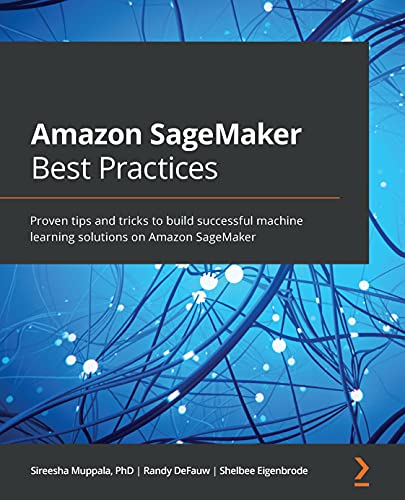Overcome advanced challenges in building end-to-end ML solutions by leveraging the capabilities of Amazon SageMaker for developing and integrating ML models into production
Key Features
- Learn best practices for all phases of building machine learning solutions – from data preparation to monitoring models in production
- Automate end-to-end machine learning workflows with Amazon SageMaker and related AWS
- Design, architect, and operate machine learning workloads in the AWS Cloud
Book Description
Amazon SageMaker is a fully managed AWS service that provides the ability to build, train, deploy, and monitor machine learning models. The book begins with a high-level overview of Amazon SageMaker capabilities that map to the various phases of the machine learning process to help set the right foundation. You’ll learn efficient tactics to address data science challenges such as processing data at scale, data preparation, connecting to big data pipelines, identifying data bias, running A/B tests, and model explainability using Amazon SageMaker. As you advance, you’ll understand how you can tackle the challenge of training at scale, including how to use large data sets while saving costs, monitoring training resources to identify bottlenecks, speeding up long training jobs, and tracking multiple models trained for a common goal. Moving ahead, you’ll find out how you can integrate Amazon SageMaker with other AWS to build reliable, cost-optimized, and automated machine learning applications. In addition to this, you’ll build ML pipelines integrated with MLOps principles and apply best practices to build secure and performant solutions.
By the end of the book, you’ll confidently be able to apply Amazon SageMaker’s wide range of capabilities to the full spectrum of machine learning workflows.
What you will learn
- Perform data bias detection with AWS Data Wrangler and SageMaker Clarify
- Speed up data processing with SageMaker Feature Store
- Overcome labeling bias with SageMaker Ground Truth
- Improve training time with the monitoring and profiling capabilities of SageMaker Debugger
- Address the challenge of model deployment automation with CI/CD using the SageMaker model registry
- Explore SageMaker Neo for model optimization
- Implement data and model quality monitoring with Amazon Model Monitor
- Improve training time and reduce costs with SageMaker data and model parallelism
Who this book is for
This book is for expert data scientists responsible for building machine learning applications using Amazon SageMaker. Working knowledge of Amazon SageMaker, machine learning, deep learning, and experience using Jupyter Notebooks and Python is expected. Basic knowledge of AWS related to data, security, and monitoring will help you make the most of the book.
Table of Contents
- Amazon SageMaker Overview
- Data Science Environments
- Data Labeling with Amazon SageMaker Ground Truth
- Data Preparation at Scale Using Amazon SageMaker Data Wrangler and Processing
- Centralized Feature Repository with Amazon SageMaker Feature Store
- Training and Tuning at Scale
- Profile Training Jobs with Amazon SageMaker Debugger
- Managing Models at Scale Using a Model Registry
- Updating Production Models Using Amazon SageMaker Endpoint Production Variants
- Optimizing Model Hosting and Inference Costs
- Monitoring Production Models with Amazon SageMaker Model Monitor and Clarify
- Machine Learning Automated Workflows
- Well-Architected Machine Learning with Amazon SageMaker
- Managing SageMaker Features Across Accounts
